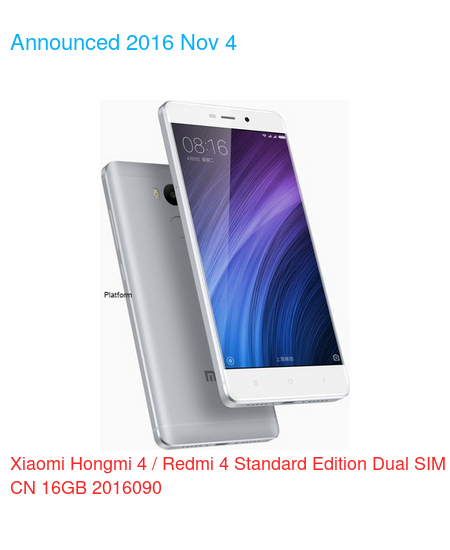| Brand | Xiaomi |
| Model | Hongmi 4 / Redmi 4 Standard Edition Dual SIM TD-LTE CN 16GB 2016090 |
| Released | 2016 Nov |
| Announced | 2016 Nov 4 |
| Hardware Designer | Xiaomi |
| Codename | Xiaomi Prada |
| General Extras | Haptic touch feedback |
| Device Category | Smartphone |
| Width | 69.6 mm |
| Height | 141.3 mm |
| Depth | 8.9 mm |
| Dimensions | 2.74×5.56×0.35 inches |
| Mass | 156 g |
| Platform | Android |
| Operating System | Google Android 6.0.1 (Marshmallow) |
| CPU Clock | 1400 MHz |
| CPU | Qualcomm Snapdragon 430 MSM8937, 2016, 64 bit, octa-core, 512 Kbyte L2, 28 nm, Qualcomm Adreno 505 GPU |
| RAM Type | LPDDR3 SDRAM |
| RAM Capacity (converted) | 2 GiB RAM |
| Non-volatile Memory Interface | eMMC 5.1 |
| Non-volatile Memory Capacity (converted) | 16 GB ROM |
| Display Diagonal | 127 mm |
| Resolution | 720×1280 |
| Horizontal Full Bezel Width | 7.34 mm |
| Display Area Utilization | 70.1% |
| Pixel Density | 294 PPI |
| Display Type | Color IPS TFT LCD display |
| Number of Display Scales | 16.8M |
| Scratch Resistant Screen | Arc Glass |
| Graphical Controller | Qualcomm Adreno 505 |
| Dedicated Graphics Memory | 0.125 MiB |
| GPU Clock: | 450 MHz |
| A/V Out | No |
| Microphone(s) | stereo |
| Loudspeaker(s): | mono |
| Audio Output: | 3.5mm |
| Supported Cellular Bands | GSM850 , GSM900 , GSM1800 , GSM1900 , UMTS2100 (B1) , UMTS1900 (B2) , UMTS850 (B5) , UMTS900 (B8) , CDMA800 (BC0) , TD-SCDMA2000 , TD-SCDMA1900 , LTE2100 (B1) , LTE1800 (B3) , LTE850 (B5) , LTE2600 (B7) , LTE900 (B8) , TD-LTE2600 (B38) , TD-LTE1900 (B39) , TD-LTE2300 (B40) , TD-LTE2500 (B41) bands |
| Supported Cellular Data Links | GPRS , EDGE , UMTS , HSUPA , HSUPA 5.8 , HSDPA , cdmaOne , CDMA2000 1x , CDMA2000 1xEV-DO , CDMA2000 1xEV-DO Rev A , TD-SCDMA , TD-HSDPA , LTE data links |
| SIM Card Slot | Nano-SIM (4FF) |
| Complementary Phone Services | Voice transmission , Voice speaker , Vibrate , Speakerphone , ANC , VoLTE |
| SAR (head) | 0.350 W/kg |
| SAR (body) | 0.990 W/kg |
| Dual Cellular Network Operation | Dual standby |
| Sec. Supported Cellular Networks: | GSM850 , GSM900 , GSM1800 , GSM1900 |
| Sec. Supported Cellular Data Links: | GPRS , EDGE |
| Sec. SIM Card Slot | Micro-SIM (3FF) |
| Touchscreen Type | Capacitive multi-touch screen |
| Expansion Interfaces | TransFlash , microSD , microSDHC , microSDXC |
| USB | USB 2.0 |
| USB Services | USB charging , USB fast charging , USB Host , USB OTG 1.3 , USB PD |
| USB Connector | USB Micro-AB |
| Bluetooth | Bluetooth 4.1 |
| Wireless LAN | 802.11a , 802.11b , 802.11g , 802.11n |
| Wireless Services | Wi-Fi Direct , Wi-Fi Tethering |
| IR | Yes |
| FM Radio Receiver | FM radio (76-108 MHz) with RDS |
| Complementary Satellite Services | A-GPS , Geotagging , QuickGPS |
| Supported GLONASS protocol(s) | L1OF |
| Supported BeiDou system (BDS) | B1I BeiDou receiver |
| Camera Placement | Rear |
| Camera Image Sensor | BSI CMOS |
| Number of effective pixels | 13.0 MP camera |
| Aperture (W) | f/2.20 |
| Zoom | 1.0 x optical zoom |
| Focus | PD AF |
| Video Recording | 1920×1080 pixel |
| Flash | single LED |
| Camera Extra Functions | HDR photo , HDR video , Red-eye reduction , Macro mode , Panorama Photo , Face detection , Smile detection |
| Aux. Camera Image Sensor | No |
| Aux. 2 Camera Image Sensor | No |
| Aux. 3 Camera Image Sensor | No |
| Aux. 4 Camera Image Sensor | No |
| Secondary Camera Placement | Front |
| Secondary Camera Sensor | CMOS |
| Secondary Camera Number of pixels | 4.9 MP sec. cam |
| Secondary Aperture (W) | f/2.20 |
| Secondary Video Recording | 1920×1080 pixel |
| Secondary Camera Extra Functions | Face detection , Face tagging , Smile detection , Face retouch |
| Sec. Aux. Cam. Image Sensor | No |
| Built-in compass | Yes |
| Built-in accelerometer | Yes |
| Built-in gyroscope | Yes |
| Additional sensors | FP sensor , Gesture sensor , Hall , L sensor , P sensor |
| Protection from solid materials | Yes |
| Protection from liquids | Yes |
| Battery | Li-ion polymer (LiPo) |
| Nominal Battery Capacity | 4100 mAh battery |
| Estimated Battery Life | 16.0 hours |
| Talk Time: | 48.0 hours |
| Market Countries | China , HK |
| Market Regions | Asia |
| Mobile Operator | China Mobile Limited China Telecom Corporation Limited China Unicom Netcom Limited |
| Added | 2024-06-22 |
Specifications data description of this 📱Xiaomi Hongmi 4 / Redmi 4 Standard Edition Dual SIM TD-LTE CN 16GB 2016090📱
Title: The Ultimate Specification Guide for Your Device 🌐📅🏋️🌈🤖🛠️🚀🔧💪🖥️🎮💻🧠🗂️📷🎥🔈📡📶💡🔋🔌
Introduction
Welcome, tech enthusiasts! Are you in the market for a new device but feeling overwhelmed by all the technical specifications? Look no further. This guide will break down the most important features, so you can make an informed decision. From the fundamentals like network and launch date to more intricate details such as processors, memory, and battery life, we’ve got you covered. Let’s dive into the ultimate specification guide for your device! 🌐📅🏋️🌈🤖🛠️🚀🔧💪🖥️🎮💻🧠🗂️📷🎥🔈📡📶💡🔋🔌
Lineup
First and foremost, it’s vital to familiarize yourself with the device lineup. Knowing the different models, their release dates, and unique selling points can help you narrow down your options and make a better decision. When comparing models, ensure you consider the device’s purpose and how well each option aligns with your needs. 📅🏋️🤖
Design
While design might not directly impact the device’s performance, it does play a substantial role in user experience. Factors such as size, weight, and materials can influence ease of use and durability. Moreover, the device’s aesthetics can reveal the manufacturer’s commitment to innovation and attention to detail. Appreciate the craftsmanship behind your potential new gadget! 🏋️🌈
Specifications
Now, let’s dive into the nitty-gritty: the specifications. Here’s a rundown of the essential components and their significance:
🌐 NETWORK: This defines the device’s connectivity options, such as 4G, 5G, or Wi-Fi. A robust network ensures fast data transfer and smooth communication.
🚀 LAUNCH: Knowing the launch date sets the stage for a device’s technological advancements. Newer devices typically outperform older ones in terms of speed, battery life, and features.
🏋️ BODY: The physical properties of a device, such as weight, dimensions, and build materials, should not be overlooked. The right balance of sturdiness and lightweight design enhances user experience.
🌈 DISPLAY: A high-quality display enriches visual content, making it a critical factor for multimedia consumption and gaming. Look for attributes like resolution, refresh rate, and panel type.
🤖 OS: The device’s operating system (such as Android or iOS) dictates compatibility, functionality, and customizability.
🛠️ CHIPSET: The chipset serves as the device’s central processing unit, governing performance, efficiency, and compatibility with software and hardware.
💪 CPU: The central processing unit (CPU) is the device’s brain, executing instructions and managing tasks. Faster CPUs result in smoother performance and quicker response times.
🖥️ GPU: A powerful graphics processing unit (GPU) ensures seamless rendering of visuals, particularly in gaming and video editing.
🎮 MEMORY: Random Access Memory (RAM) and storage capacity impact how many applications and data your device can manage concurrently. More memory allows for better multitasking and app performance.
📷 CAMERA: Camera specifications include resolution, aperture, and features such as optical image stabilization. These factors dictate photo and video quality.
🎥 SOUND: Top-notch audio output enhances multimedia consumption and communication. Look for specifications like stereo speakers and noise-canceling technology.
📡 COMMS: A robust communication suite, including Bluetooth, NFC, and GPS, widens the device’s capabilities and improves user experience.
💡 FEATURES: Unique features distinguish devices and enhance user experience. Examples include facial recognition, water resistance, and wireless charging.
🔋 BATTERY🔌: A long-lasting battery is crucial for extended usage and on-the-go functionality. Battery capacity (mAh) and charging speeds help determine the device’s endurance.
Conclusion
Understanding the specifications of a device can empower you to make the best possible purchasing decision. With a clear grasp of network, launch, design, and component specifications, you’re well-equipped to choose a device tailored to your needs.
Finally, don’t forget to leave a comment with your thoughts and questions. We’d love to hear your feedback and engage in discussions about technology!
Happy device hunting! 🌐📅🏋️🌈🤖🛠️🚀🔧💪🖥️🎮💻🧠🗂️📷🎥🔈📡📶💡🔋🔌














